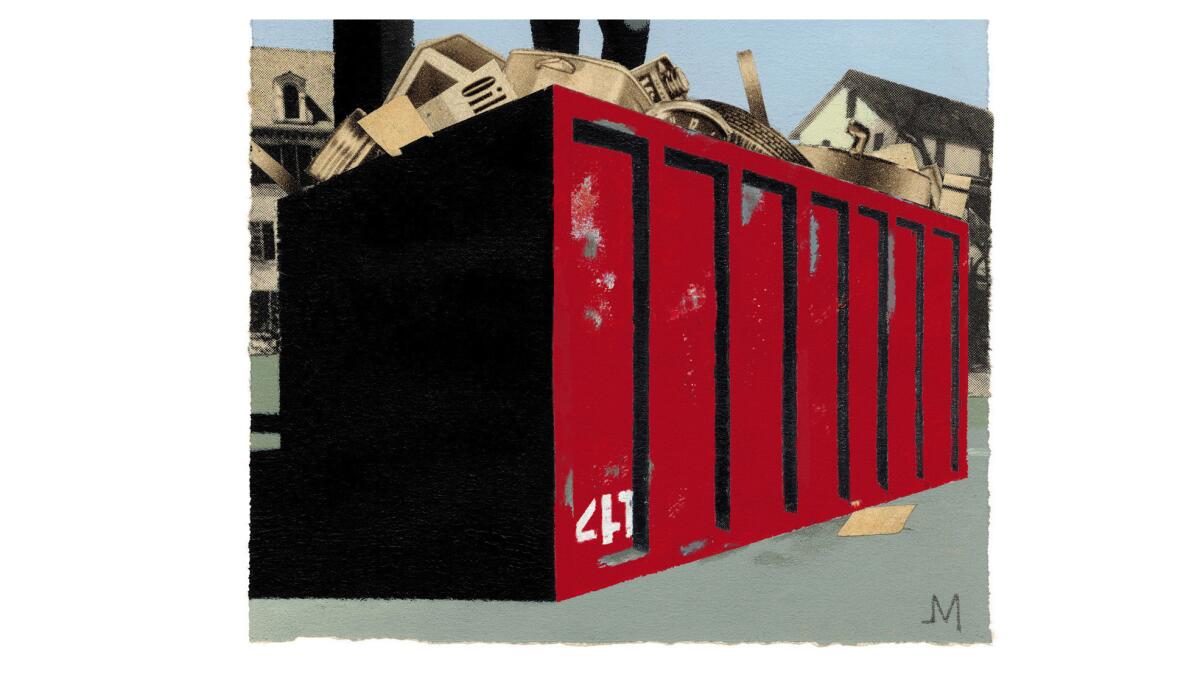Op-Ed: When in doubt, throw it out? If only it were that easy to deal with possessions

- Share via
After my daughter and I admire the shells we pick up on the beach, she drops hers into her bulging pockets, while I toss mine back into the surf. Is this youth versus maturity? Youth gathering up for the nest she hopes to fill with a mate and babies, while maturity wants to heave everything, including the babies and all their junk, out of the nest?
Part of my anti-thing campaign, I’m sure, has to do with having had to dismantle my parents’ household last year as they moved into assisted living. There’s nothing like wading through someone else’s stuff to make you eye your own stash differently. It makes me shudder, picturing my brood slogging through my effects, smirking, crying or worse, fighting over my leavings.
And yet, I’ve had time to reflect since I dispatched my parents’ possessions, and now I find myself thinking that our ties to inanimate objects can be ... complicated. I don’t want to snatch back the end tables from Habitat for Humanity or pluck my mom’s donated shoes off strangers’ feet, but like so many things I’ll never do again, I wish I’d lingered just a bit, and noted the passing of possession.
I don’t have TV, but when I visit (make that visited) my parents’ home, I love (loved) to watch “Hoarders.” It was a delicious show about the difficult struggle for control over possessions. It wasn’t the drama or heartbreak that kept me glued, it was the actual stuff. The appalling, thrilling, excessive number of things that the hoarders had gathered and stored.
How could I not admire their tenacity, their willingness to take it so far? If, in the end, we are nothing more than memories and the sum of our possessions, then aren’t the hoarders an exaggerated, almost heroic version of everyone’s acquisitiveness and attachment to things?
And by “things” I don’t just mean the sacred treasures our ancestors brought over from the old country, or even banal essentials like toilet paper and car keys. But also the whatnot stuff of everyday. That is the kind of stuff that, upon my return from emptying my parents’ house, I began frantically weeding out of my own closets and bookshelves while chanting, “I don’t need this, or this, or this...”
As lifelong minimalists, my parents were the antithesis of hoarders, and yet, breaking down their household felt like a monumental task. They never bought in bulk or let anything spoil in their fridge. But the number of things they’d accumulated over their lifetimes was staggering.
Even so, my mom’s motto has always been, “When in doubt, throw it out.” When I was growing up, she applied that sentiment not only to her own things, but to mine and my brother’s as well. To say this was infuriating at the time would be to understate, but now I’m grateful.
My chore would have been even more nightmarish had my parents been ambivalent or well-intentioned savers, unsure if they’d ever need this bent curtain rod again or thinking they might mend this old sweater someday.
I’m glad they weren’t sentimental savers, either. True, had they allowed any remnant of my past to survive I might have unearthed the adorable stories I wrote and illustrated when I was 4. But I’d also be left to determine the fate of equally adorable stories that I wrote at 5 and 6 and 6 1/2.
Plus, if they had been the type to cherish memorabilia, wouldn’t I also have had Hallmark Valentines and withered corsages to deal with? It would be tricky to toss something that had remained untossed for decades. Even if an object had escaped the trash simply by oversight, it would feel weird to be the one to give it the heave-ho, because the passage of time invests even old shopping lists with gravitas.
And once the shopper is dead, and the possibility of generating future lists is null, the gravitas becomes gravitational. Not long after my parents moved, my father died. In his violin case, I discovered a yellowed, not particularly funny cartoon he must have torn out of the newspaper. I read it 50 times trying to understand why he’d saved it. My children will ultimately face that puzzling cartoon as well, because it was one of the few things I was unable to let go.
As it is, I was in a hurry to deal dispassionately, efficiently with the chore of closing up and moving on. I don’t regret my brisk settling of accounts, but I am slightly haunted by thoughts of the coats that always hung next to each other, hanging separately now. Tools that had labored together to build my father’s harpsichord now following unrelated paths to their murky futures in strange new tool boxes or thrift store bins, or landfills.
So I relate to the TV hoarder’s heartbreak over the disarrangement of her hoard. Her things unmoored, abruptly scattered, left without her protection, without their shared history. No longer her comforting collection, but just individual lone objects. Random un-storied stuff. Trash.
Or like the pretty shells on the beach that we pick up to admire, then toss into the waves.
Amy Goldman Koss is the author of “Side Effects” and many other books for teens.
Follow the Opinion section on Twitter @latimesopinion and Facebook
More to Read
A cure for the common opinion
Get thought-provoking perspectives with our weekly newsletter.
You may occasionally receive promotional content from the Los Angeles Times.









